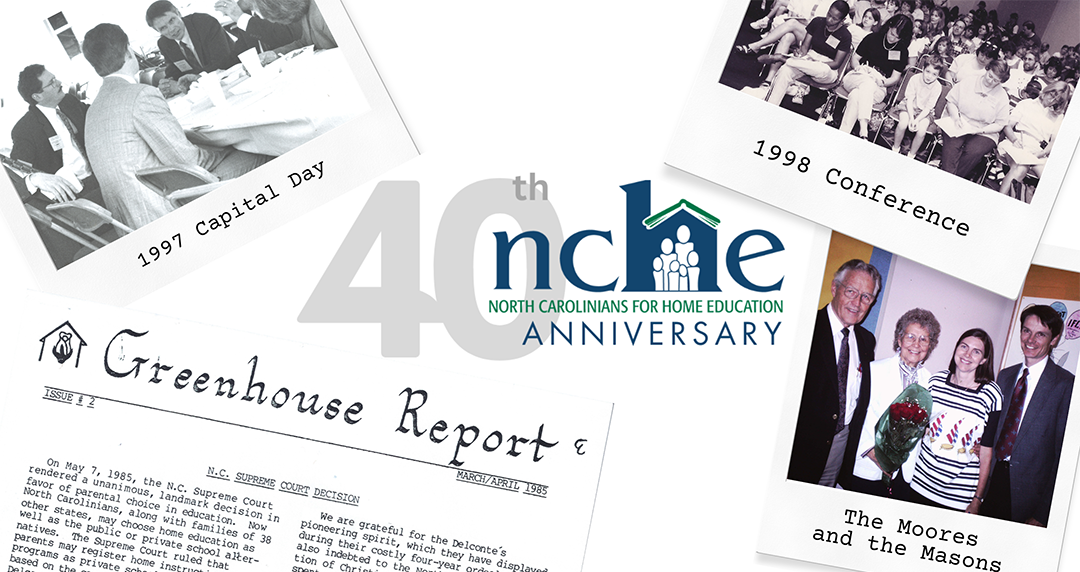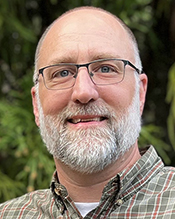Fall 2024/Matthew McDill
North Carolinians for Home Education is celebrating our fortieth anniversary this year! This article is part three in a series that recounts the history of the modern homeschool movement in NC (see the first two articles in the spring and graduate issues of GREENHOUSE). We are so grateful for the tireless commitment of pioneer NCHE leaders who worked to make NC a wonderful place to homeschool. It is time to remember, celebrate, and be grateful.
In this final article of the series, I will continue to share portions of the Facebook posts that Debbie Mason wrote outlining the history of NCHE and homeschooling in NC. Debbie took much of the content from Spencer Mason’s “Home Education in North Carolina: the Early History 1979-1988.” Debbie, our events director and media director, and her husband Spencer, our law and policy director and office administrator, have been serving on the NCHE board since the 1980s.
A New Homeschool Law—1987-1988
1987년 12월의 헤드라인 온실 보고서 read, “Will This Be the Last Year for Home Education?” This heading was not a sign of surrender but a call to action. NCHE assured homeschoolers that just because HB 837 had passed the NC House, it would have to pass in the NC Senate in order to be law. We could still beat this! We encouraged homeschoolers to continue to contact their legislators to oppose HB 837. With the input of homeschoolers across the state, NCHE formulated a plan—four mailings would be sent to every legislator with information about the current regulations of homeschooling, controversial issues surrounding the issue of home education, and a solution. We also asked NCHE members to invite their representatives and senators to visit their homeschools during the month of May.
NCHE wrote a bill to substitute for the current one being considered. One crucial step in the bill’s success was finding a prominent member of the Education Committee to sponsor the substitute bill on NCHE’s behalf.
There were 189 homeschool families who volunteered to invite legislators to visit their homeschools. The strategy worked, and many legislators changed their minds and became supportive of home education. One senator, Dennis Winner, a prominent Democrat and member of the Senate Education Committee, agreed to introduce the NCHE substitute bill. He had read the four letters, visited a homeschool, and came away with such a good opinion of homeschooling that he agreed to introduce the NCHE substitute bill if NCHE agreed to insert a requirement that standardized testing be required annually for homeschools (at that time, homeschoolers, as with all non-public schools, were required to test in grades 3, 6, and 9). NCHE felt that it was critical to get his support and agreed to this change.
When Senator Winner introduced the NCHE substitute bill, NCHE members were asked to contact their legislators and ask them to support the substitute bill with no changes. The bill made it to the Senate floor with only minor changes to the wording. Then Senator Helen Marvin introduced an amendment that homeschool teachers have a minimum of a high school diploma or the equivalent. Attempts to defeat this amendment were unsuccessful, and the bill passed the Senate with an overwhelming majority.
NCHE 이사회는 홈스쿨 교사가 고등학교 졸업장을 소지해야 한다는 요건 추가에 만족하지 않았지만, 1987년에 도입된 법안보다 이것이 훨씬 더 살기 쉽다는 점을 인식했습니다. 하우스를 통해 변경합니다. 그러자 하원은 만장일치로 법안을 통과시키기로 결정했습니다.
새로운 법은 완벽하지는 않았지만, 홈스쿨러들이 최소한의 정부 개입으로 자녀 교육 방법을 통제할 수 있도록 했습니다. 먼지가 가라앉자 홈스쿨링 학생들은 이 새로운 법이 기도에 대한 응답임을 인식하기 시작했습니다. NCHE는 주 공교육부와 노스캐롤라이나 교육자 협회(NCAE)를 상대로 승리를 거두었습니다! 이것은 진정한 다윗과 골리앗의 이야기였습니다.
Debbie Mason remembers when all this took place: “In spring of 1988, Spencer became the first NCHE region 4 vice president. We were already active members of NCHE, but now we were on the board. We invited our representative to our house, but he chose to meet with Spencer in his office. After the meeting, he pledged to support our position. We were not in Raleigh when the bill was passed. We were in bed (It was in the wee hours of the morning.) and got a call from one of our board members who gave us the good news.”
Time for a Change: The Homeschool Law Gets Tweaked—2013
After twenty-five years of living with the homeschool law, one hiccup kept nagging the homeschool community. It had to do with the interpretation of the definition of a homeschool—“’Home school’ means a nonpublic school in which one or more children of not more than two families or households receive academic instruction from parents or legal guardians, or a member of either household.” Since the 1988-89 school year, NCHE had a running debate with DNPE. They interpreted the homeschool law to require homeschool parents to provide 모두 fundamental core instruction (language arts, math, science, and social studies) in their homeschools. Rufus Edmiston, the NC attorney general, had issued an opinion saying this. NCHE took the position that the law didn’t require the parent to personally provide 모두 the fundamental instruction—that they could get help outside of the home when they needed it. According to the DNPE interpretation, no one outside the home, including grandparents, could provide fundamental instruction. Parents who had children with learning disabilities still could not employ a specialist to help their children. Co-ops where fundamental instruction was provided were not in compliance with the homeschool law.
While this debate with DNPE was going on, NCHE advised homeschoolers to tell their legislators, “We like our law; please don’t change it.” The reason for this incongruence was two-fold. One reason was that DNPE had implemented a “don’t ask, don’t tell” policy. Most homeschooled students were getting help from outside the home and were not suffering any consequences. And two, we were concerned that opening up the law with legislative action could result in more homeschool regulation. However, through the years, NCHE had been contacted by several homeschool parents who were negatively impacted by the DNPE interpretation and this problem seemed to be getting worse.
NCHE had not attempted to change the homeschool law since May 1988. Since then, NCHE had focused on being a watchdog (and sometimes an attack dog) to 보호하다 homeschooling rights in NC. However, 2013 was an opportune time to go on the offensive because of the results of the November 2012 elections.
In the fall of 2012, the NCHE legislative committee began to ask, “If we could change the law to fix this problem, what would it look like?” After the November elections, Spencer Mason proposed that the legislative committee support changing the homeschool law and was authorized by the board to do so.
At the beginning of the process, we met with several homeschool groups in the state to explain the goal and ask for advice. In addition to these meetings, NCHE consulted with homeschool dads who were attorneys, HSLDA lawyers, legislators, and legislative bill writers. The overwhelming majority of homeschoolers who responded were in favor of our efforts. However, we began to hear from a small, but vocal, number of homeschoolers who opposed changing the law in any way. There were several objections, but the primary reason was fear that attempting to change the law for the better might result in a worse law. NCHE was well aware of this danger.
Much time was spent on the wording of the definition of a homeschool. Once we settled on the best definition, we got sponsors in the House and Senate, and our bills were filed. We spent a lot of time lobbying legislators on both sides of the aisle, and we had considerable help from the homeschool community, especially a newly formed PAC, NCCHE. Our bills passed every vote unanimously with no changes.
Here is the definition in the new law: "홈 스쿨"은 부모나 법적 보호자 또는 가구 구성원이 학업 교육의 범위와 순서를 결정하고 학업 교육을 제공하며 추가 출처를 결정하는 두 가족 또는 가구 이하의 자녀로 구성된 비공립 학교를 의미합니다. 학업 지시.
Debbie reflects on this period in time: “Spencer lost his job shortly before he took on the leadership of getting this bill passed, and it is a good thing that he had the time to devote to it, because it took all of his time. It was basically a full-time job. It was an exciting time watching the bill pass unanimously on all votes, even with legislators who do not like homeschooling.”
Over the past forty years, homeschooling has grown from a small group of pioneers to a large community and has become a well-accepted form of education. However, there have always been those who want to curtail our success and add regulations to limit our freedom. NCHE has grown and evolved to meet the changing needs in the growing homeschool world. We have succeeded in our goal of making NC a great state in which to homeschool by fighting to make it legal and equipping and encouraging homeschool families. Today, we carry on our mission to help parents homeschool with confidence and joy by protecting your right to homeschool, equipping you with information and encouragement, and connecting you with other homeschoolers across the state.



